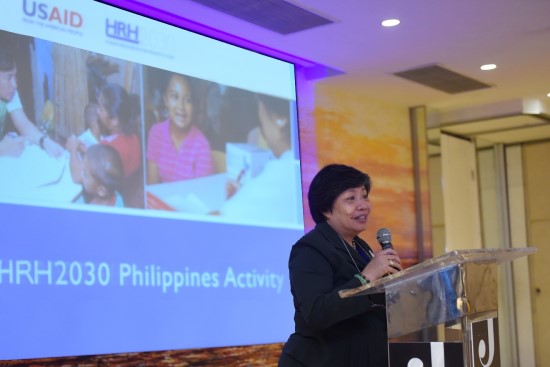
02 May USAID’s HRH2030 Philippines Project Director Designated Member of National Taskforce for Universal Health Care Act
With the much-anticipated Universal Health Care Act signed into law on February 20, 2019, the Philippine government appointed a national taskforce to develop its implementing rules and regulations. USAID’s HRH2030 program is happy to announce the government designated Philippines Project Director Dr. Marilyn Lorenzo to serve on the Service Delivery Technical Working Group to oversee development and writing of the human resources for health (HRH) component.
“It is an honor to represent USAID and HRH2030 on the universal health care taskforce and advocate for HRH in the implementing rules and regulations. This an opportune time to elevate HRH from merely focusing on an adequate number of health workers to increasing investments in effectively managing and developing the workforce to meet our tuberculosis and family planning goals.”
– Dr. Marilyn Lorenzo,
HRH2030 Philippines Project Director
The Act contains four provisions under its chapter on HRH, including (1) developing a national HRH master plan, ensuring health workforce decisions are based on population health needs; (2) creating a national health workforce support system, prioritizing deployment to geographically isolated and disadvantaged areas; (3) expanding health training and scholarship programs particularly for underserved areas; and (4) strengthening the return service agreement for government-funded health program scholarship recipients, so they are retained and practice in-country at the completion of their training.
USAID, through the HRH2030 Philippines activity, works with the Philippine Department of Health to strengthen the country’s health workforce delivering tuberculosis and family planning services by working to improve HRH planning, management, and development, and by advancing the use of data for HRH decision-making at the central and regional levels.
HRH2030 will utilize its positioning to help the Philippine government shape the direction of the Act’s implementation. In particular, the project’s research and assessments will provide much needed evidence to develop the implementing rules and regulations to meet the Philippines’ tuberculosis and family planning goals. Currently, HRH2030 is finalizing a health labor market analysis, Workload Indicators of Staffing Need analysis, Department of Health deployment program review, and patient experience case studies. Over the past year, HRH2030 also reviewed HRH-related policies to identify gaps with a focus on strengthening return service agreements. Other HRH2030 interventions will add important content to the Act’s approach to HRH, including accessing health worker competencies, launching e-learning for training and development, establishing interoperable and standardized human resource data and information systems, and introducing national health workforce accounts. Through these activities and participation on the national taskforce, USAID through HRH2030 looks positively to supporting the Philippines to manage and develop a fit-for-purpose and fit-for-practice health workforce to improve access to quality health services.
Photo: USAID’s HRH2030 Philippines Project Director Dr. Marilyn Lorenzo introduces the HRH2030 program to national and regional health stakeholders. Photo credit: Blue Motus/Chemonics International





